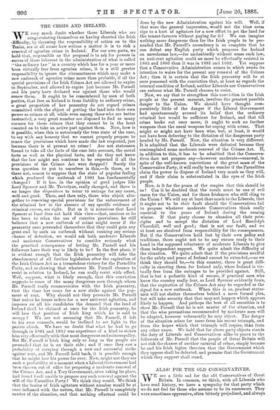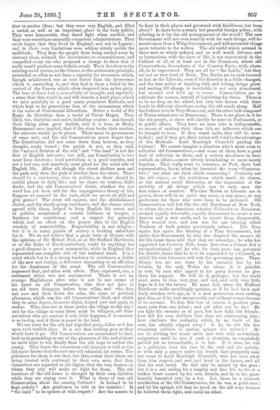ALAS! FOR THE OLD CONSERVATIVES.
WE are a little sad for the old Conservatives of Great Britain. In common, we think, with all Liberals who have read history, we have a sympathy for that party which we do not feel for those who assume to be its successors. They were sometimes oppressive, often bitterly prejudiced, and always
slow to receive ideas ; but they were very English, and filled a useful, as well as an important, place in the body politic. They were honourable, they dared fight when needful, and they were sometimes unusually competent administrators. They never forgot that they lived in England, and not in Laputa ; and in their very limitations were seldom utterly unlike the multitude. They kept the people from being carried away by abstract ideas, reduced the doctrinaires to reasonableness, and compelled every one who proposed a change to show that it really would produce some definite result. Their devotion to the existing social system, to the Crown, to the aristocratic principle, proceeded as often as not from a capacity for reverence, which, though misdirected, was at root better than the irreverence which is succeeding it, and they had in them a belief in the control cf the Unseen which often deepened into active piety. The best of them had a masculinity of thought, and especially a sense that this world is, and will remain, a hard place, which we miss painfully in a good many prominent Radicals, and which kept us for generations free of the screaminess which is the curse of Continental Liberalism. Better a world of Sir Roger de Coverleys than a world of Victor Hugos. They liked, too, discipline and order, including routine ; and though their liking often grew foolish, still it is true, as Henry Drummond once implied, that if the stars broke their routine, the universe would go to pieces. There must be government of some sort, and the old Conservatives never forgot that. The Constitution did not come down from heaven, as they thought, ready bound ; the parish is not, as they said, the "natural division of the soil," and "the land" is not the first of English interests ; but still, any Constitution to live must have devotees ; local patriotism is a good impulse, and not a bad one, and somebody must plead for the rural side of English life. After all, though the street shelters men and the park only deer, the park is lovelier than the street. There should be a rest-loving class in politics, as there should be restful places in daily life ; and we share, we confess, Mill's doubt, and the old Conservatives' doubt, whether the last word has yet been said for the unprogressive theory of life.
Suppose we succeed in the rush, shall we never sit still and give praise ? The stout old squires, and the old-fashioned clerics, and the steady-going merchants, and the classes which agreed with them, helped to keep English life sweet, and in politics maintained a certain loftiness of temper, a fondness for consistency, and a respect for principle which had an effect on the people akin to the English worship of respectability. Respectability is not religion ;
but it is in many grades of society a working substitute for it. We do not believe that a great body of electors with the opinions of Sir Robert Peel, or of Sir Stafford Northcote, or of the Duke of Northumberland, could be anything but a good element in a great community, while in England they represented one complete side of the national mind. It is a mind which has in it a strong tendency to resistance, a dislike of the new and foreign, a deference amounting to an affection for the dominance of the usual. The old Conservatives expressed that, and often with effect. They expressed, too, a sentiment which was not sentimental. There is not an average Englishman alive who is not in one corner of his heart an old Conservative, who does not hate to see old trees disappear before trim villas, and who does not now and then desire the calm, the sense of political afternoon, which was the old Conservatives' ideal, and -which they in some degree, however slight, helped now and again to realise. Who does not at times prefer the village to the city and for the village to exist there must be villagers, old Conservatives who are content if only little happens, if to-morrow is as to-day, and if there is peace in the land.
We are sorry for the old and dignified party, fallen as it has upon such terrible days. It is not that nothing goes as they would have it go. Old Conservatives are accustomed to that, look upon grumbling as one of the pleasures of life, and at heart no more hope to win finally than the old hope to outlast the young. They know the innovators will triumph as well as the old squire knows that the new one will refurnish his rooms. The grievance for them is not that, but this,—that their ideals are being treated with contempt by their own men, that they themselves are regarded as old fogies, that the very leaders on whom they rely will make no fight for them. The old furniture of the old house is changed by their own children while they are crying over it. What is there of true old Conservatism about the coming Cabinet ? Is Ireland to be kept orderly ? Are gentlemen to rule in the counties ? Is "the land" to be spoken of with respect ? Are the masses to
be kept in their places and governed with kindliness, but from above ? Is there to be a steady but peaceful foreign policy, with.
a feeling in it for the old arrangements of the world ? The new Government will not even heartily wish for such things, will innovate more than a Whig Government, and will surrender things more valuable to the wolves. The old world which seemed to these men so wisely ordered, and so well worth defence, and so harmonious with the facts of life, is not represented in the Cabinet at all, or at least not in the Commons, where old Conservatives, descendants of the Country Party, wish, above all, to be represented. They are all for 'the Lords," but they are not so very fond of Peers. The Tories are to rush forward as fast as the Liberals, even if the direction is a little changed, and the true policy of standing still, and letting things grow, and waiting till change is inevitable, is not only abandoned, but scouted and held up to scorn. Conservatives are to cultivate the masses, instead of legislating for them. There is to be no drag on the wheel, but only two horses with their heads in different directions racing the old coach along. Half the Cabinet is to be Tory-Democrat, and the other half composed of Tories submissive to Democracy. There is no place in it for the old people, as there will shortly be none in Parliament, or in public affairs. They have no man who is indispensable, no means of making their ideas felt, no influence which can be brought to bear. If they stand aside, they will be overlooked ; and if they act, their action will tend to the advantage of the Radicals. Lord Randolph Churchill guiding the Cabinet! We cannot imagine a situation which must seem to reflective old Conservatives,—and some of them have a good deal of reflection in them, and a certain steadiness in their outlook on affairs,—more utterly humiliating or more nearly hopeless. They really want to conserve, as Peel, their best representative, knew, when he invented the term "Conserva
tive ;" but what are their chiefs conserving ? Certainly not the old regime, or the restfulness which made its charm,
or the ancient social hierarchy, or the impression of the stability of all things which was to such men the first source of comfort. Whether Tories or Liberals are in power, there will be no quiet any more, or any peace, or any preference for those who were born to be preferred. Old Conservatives will feel like the old Dutchmen of New York, to whom the new American, whether Federalist or Democrat, seemed equally detestable, equally determined to create a new heaven and a new earth, and to create them disagreeable.
They wanted rest, and rest was the one blessing which Yankees of both parties persistently refused. The Tory squire has again the blessing of a Tory Government, but under that Government he who has despised the masses all his life hears them told that they are sovereign ; he who has supported ten Coercion Bills, hears that even a Crimes Act is unconstitutional ; and he who for forty years has governed his district, hears that he is to be superseded by a Council, in which his own labourers will seat the governing men. These things, too, are not done by his enemies, but by his friends, by the only Tories for whom it is possible to vote, by men who appeal to his party honour to give them his support. He will do it, perhaps ; but the world must seem to him very gray and sad, and with very little hope in it for the future. He must feel, when Sir Stafford
Northcote walks unwillingly upstairs, as if he had been suddenly stricken with age, as if a new generation were rushing past him, as if he had unexpectedly and without reason become of no account. To him that loss of esteem is positive pain, more pain than any defeat ; and yet what can he do ? He can fight his enemies as of yore, but how fight his friends ; how tell his own children that they are contemning him ; how vindicate the authority which, by no fault of his own, has silently slipped away ? Is he to stir his few remaining soldiers to mutiny against his colonel ? He can do nothing but stand aside and wait with melancholy resignation until he sees if such a situation, so exquisitely painful yet so irremediable, is to last. If it does, he will as a politician turn his face to the wall and die quietly, or with only a prayer under his breath that prosperity may not come to Lord Randolph Churchill, who has torn away from him respect, and rest, and trust in the future, and all that his soul loved. He will only be missed by the poor ; but it is a sad ending for a lengthy and fine life to die of a broken heart caused by his own friends, and lie in the grave heartily lamented only by a foe. Let there be a pleasant recollection of the Old Conservative, for he was a good man ; and let his epitaph tell that he stood on the old ways because he believed them right, and could no other.



































 Previous page
Previous page